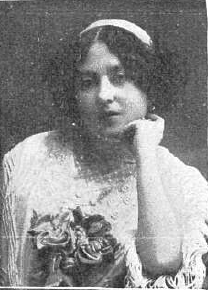Concha Espina
María de la Concepción Jesusa Basilisa Espina , known as Concha Espina (y Tagle) , (born May 14 or April 15, 1869 or 1877 or April 15, 1879 in Santander , † May 19, 1955 in Madrid ) was a Spanish writer.
Life
Concha Espina published her first poems in the journal El Atlántico under the anagram Ana Coe Snichp . In 1892 she married Ramón de la Serna y Cueto , with whom she had five children, and went to Chile with him. In 1898 she returned to Spain, where her study Mujeres del Quijote appeared in 1903 . In 1909 she moved to Madrid and published her first novel La niña de Luzmela . Her play El jayón (1918) was the model for Francisco Mignone's opera L'innocente .
In the early 1920s, Concha Espina visited Berlin, and in 1924 she received a prize from the Real Academia Española (RAE) and was awarded the Orden de Damas Nobles de María Luisa . In 1928 she became a candidate for the RAE and was nominated for the Nobel Prize. In 1938 she became an honorary foreign member of the American Academy of Arts and Letters . In the next few years she went blind. In 1955 she was awarded the Medalla del Trabajo .
Works
- Mis flores , poems (1904)
- Trozos de vida , short stories (1907)
- La niña de Luzmela , novel (1909)
- La esfinge maragata (1914); (German: "Die Sphinx Margata", 1940)
- La rosa de los vientos (1915)
- Al amor de las estrellas (1916)
- El metal de los muertos (1920); (German: "The metal of the dead", 1922)
- El cáliz rojo (1923)
- Altar mayor (1926)
- La flor de ayer (1932)
- El más fuerte (1945)
- Valle en el mar (1950)
Web links
- Concha Espina. Escritoras.com
- Concha Espina. El Poder de la Palabra
- Concha Espina. Islabahia.com
Individual evidence
- ^ Honorary Members: Concha Espina. American Academy of Arts and Letters, accessed March 10, 2019 .
| personal data | |
|---|---|
| SURNAME | Espina, Concha |
| ALTERNATIVE NAMES | Espina, María de la Concepción Jesusa Basilisa; Espina y Tagla, Concha |
| BRIEF DESCRIPTION | Spanish writer |
| DATE OF BIRTH | April 15, 1869 or May 14, 1869 or 1877 or April 15, 1879 |
| PLACE OF BIRTH | Santander , Spain |
| DATE OF DEATH | May 19, 1955 |
| Place of death | Madrid , Spain |

